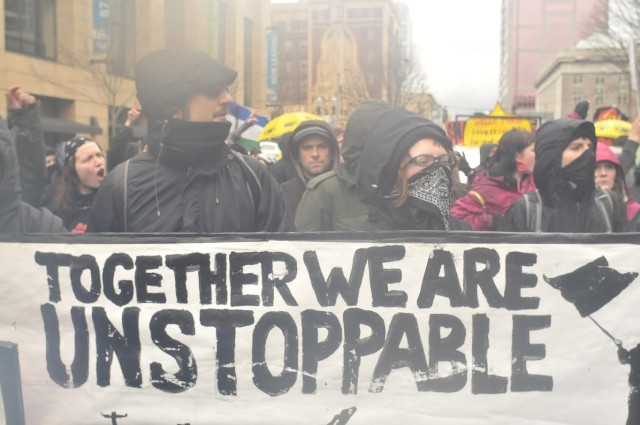
Story by Pete Shaw
Four years ago in these pages I wrote, “I held my nose and voted for Clinton, and as the returns came in Tuesday night, I was not pleased. But it really didn’t change a thing in my calculus as it were because I see voting as a tactic and not an end. I would have probably written, with a slightly different angle, the same words had Clinton won…But the fact is this: when on Election Day my better 99% left the house and asked me if I was worried about the election I replied, ‘Yes, but regardless of the outcome, we will be doing the same work tomorrow. It just may be a little more uphill.’”
While “uphill” turned out to be a tsunami of understatement and I still think voting is an important tactic to make use of, the real work of politics lies in getting involved with organizations fighting for the things you value.
Voting ultimately strikes me as an exercise in buying time. For example, Joe Biden and the Democratic Party are light years ahead of Donald Trump and the Republican Party on climate change. They are who we have a better chance to influence on combatting the effects of climate change, never mind cutting the greenhouse gases contributing to climate change.
Yes, the Democratic Party is tethered to capitalism. It is a capitalism-committed party that will look close to last at the unprofitable solutions that are likely necessary if the human species is to survive. I voted for Biden because close to last is very different from not being on the agenda at all. And the only solutions on the Trump Administration’s agenda are those capitalist ones that maximize private profit. So I checked the box next to Biden’s name, marked some other ones, put my ballot in the envelope, applied a stamp, and put it in the mailbox.
At the same time, I know far too many people whose minds and actions I revere and deeply respect, who either refuse to vote on various principles, or who withhold compliance with the lesser-of-two-evils argument. Many of them carry the burdens of history–of my version of history, that of a white, nominally Christian, male–and I will neither quarrel nor quibble with them. Many of them, not white, would argue that this country and its capitalist system were never made for them, although both have a long history of exploiting them. I would never argue otherwise, and I likewise cannot argue against their hard earned Wisdom regarding voting.
Beyond that, just about every one of them that I know is involved in organizing for the world they want to see, politicians be damned. I wholeheartedly agree with their fundamental idea that real change is found in that organizing, not at the ballot box.
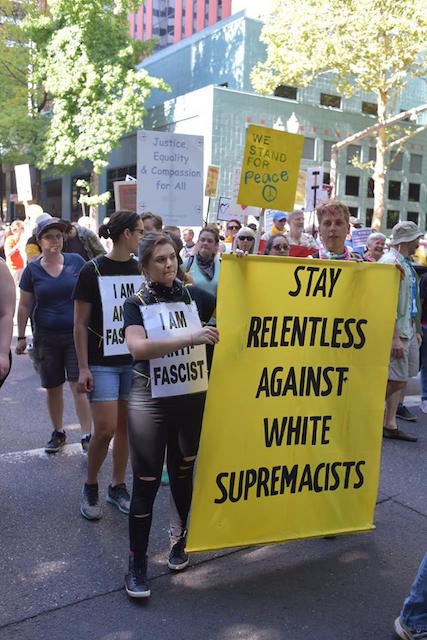
When I wrote those lines four years ago, I mentioned my good and great Friend, Ahjamu Umi of the All-African People’s Revolutionary Party. He has committed his adult life to organizing African people for an Africa that belongs to them and is truly free. I knew regardless of the outcome of the 2016 election, as well as this one, his focus would remain the same: organize, organize, organize.
One of the many things I learned from Ahjamu and the other good and great people with the A-APRP, as well as numerous other greater-justice seeking organizations, is that we always need to do better at educating people about the systemic nature of the problems we face. An example of this need came during the second and final presidential debate when Biden rightfully scolded Trump about his administration separating families at the border and keeping children in cages. Trump argued back, in crass and artless form, that Biden, which was to say the Obama Administration, had built those cages. Trump’s reply basically translated to, “But you left the cages for us. How could we not use them?” It was as succinct an example you could give of how white supremacy is a vicious gift that keeps giving.
A more honest answer would have been, “We were just continuing from where you left off.” After all, the Obama Administration not only deported more people than the preceding W. Bush Administration. It put up substantial and cruel barriers to mothers and children from, in particular El Salvador, Honduras, and Guatemala seeking refugee status, fleeing horrific conditions directly related to the US backed Dirty Wars. It separated families. It put children in cages.
Yes, it may be correct to say that the Obama Administration never made it official policy to separate children from parents. But what material difference did that make? Regardless, it is far more illuminating to notice that the Obama Administration sure made it easier for Trump to sanction it as policy, and now we find ourselves at a point where nobody seems to know where the parents of 666 children are, among other horrors along the continuum.
The Obama Administration took its cues from the W. Bush Administration, which too separated children from parents, but again, as far as we know, not as official policy. Admittedly, it is difficult to take seriously claims of official versus non-official policies. The United States has always separated children from parents. The US separated indigenous children from indigenous parents. The US separated the enslaved African children from their enslaved African parents, and for good measure, made a tidy profit from the transaction. The US separated Japanese children from Japanese parents.
The US continues to separate children from their parents. It’s as much a part of the United States as apple pie.
So I offer no illusions about Biden. Neither does Biden offer illusions about himself. On November 12, he named Cecilia Muñoz, one of President Obama’s top immigration advisers, to his transition team. Muñoz justified the Obama Administration’s cruel and hard immigration policies, including its deportation of thousands of children from El Salvador, Honduras, and Guatemala, saying in a PBS interview with Maria Hinojosa, “At the end of the day, when you have an immigration law that’s broken and you have a community of 10 million, 11 million people living and working in the United States illegally, some of these things are going to happen, even if the law is executed with perfection. There will be parents separated from their children. We don’t have to like it, but it is a result of having a broken system of laws. And the answer to that problem is reforming the law.”
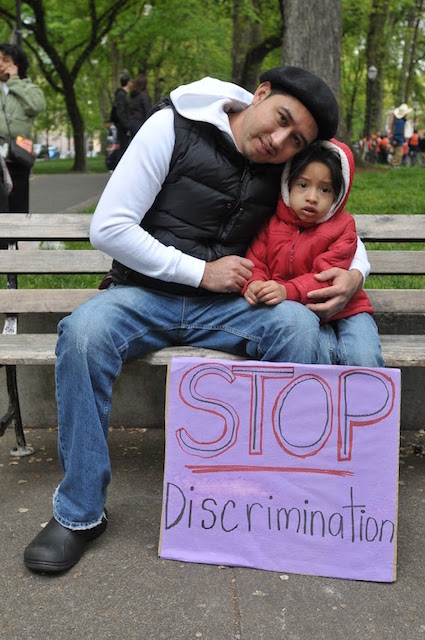
It was the same odd bloodthirsty yet hollow tone I recall from back in May 1996 when Secretary of State Madeleine Albright, upon being told that the Clinton Administration’s sanctions on Iraq had resulted in the deaths of 500,000 children, said, “I think this is a very hard choice, but the price–we think the price is worth it.”
While you could run a line from the children in cages at the Mexico-US border back to the Declaration of Independence when talking about the United States’ horrific policies toward Others, it is perhaps best to clip this bit of 244 year long thread by noting it was the Clinton Administration that began building the wall along the Mexico-US border that the Trump Administration has been hell bent on extending.
Cruelty is bipartisan, deeply historic and systemic.
In this publication, we have written about some of the groups organizing for a more just world. Some folks involved in these groups engage in electoral politics, and others do not. Regardless, they and their organizations are the ones doing the heavy lifting, who realize the greatest movement toward a more just world takes place outside of the ballot box. It behooves us to listen to them and follow their lead.
Nevertheless, I would like to argue that whatever it is we call The Left needs to do a better job with how it uses voting. Because elections have consequences. Which brings us to the recent local election where the two candidates who prevailed–Ted Wheeler edged out Sarah Iannarone and Mingus Mapps, who took money in-kind from the police union to help fund his campaign, beat Chloe Eudaly–are the ones who have shown the least inclination to bring the Portland Police Bureau (PPB) to task.
It is a fact that Iannarone and Eudaly had gone on record in terms of their unequivocal support for reigning in the PPB. (Iannarone had pledged to turn the PPB over to Councilperson Jo Ann Hardesty at the start of her term, and Eudaly had been working with Hardesty to craft PPB cuts.) Either one of them arguably would have been a reliable third vote for significant progress on that front.
We should take to heart that these two seats represent a significant missed opportunity. For proof, we need look no further than tireless PPB change agent Hardesty’s endorsement of both women. It also is difficult to argue with Hardesty’s recent assessment in a piece by Nigel Jaquiss in the Willamette Week, “Clearly, there was a disconnect on the left about what was good enough. The left is consistent at pulling defeat out of the jaws of victory.”
In the mayoral race, Wheeler took 46% of the vote, Iannarone, 41%, and 13% went to write-ins. If you add Iannarone’s total to the 13% write in vote it’s clear that not only does Wheeler lack a mandate but further, if just over 20,000 of those 46,000 write in votes (a great majority we can presume were largely cast for Teressa Raiford) had swung for Iannarone, the incoming council picture would look significantly differently.
Again, I don’t mean to vote shame the folks who decided that neither of the two mayoral candidates who emerged from the primary sat well with them, especially if they chose to write in Raiford, whom I always try to note is one of our community’s great treasures, an indefatigable organizer for justice, particularly as it relates to police violence. She, like so many others I am privileged to know, is good and great, a wondrous and wonderful person.
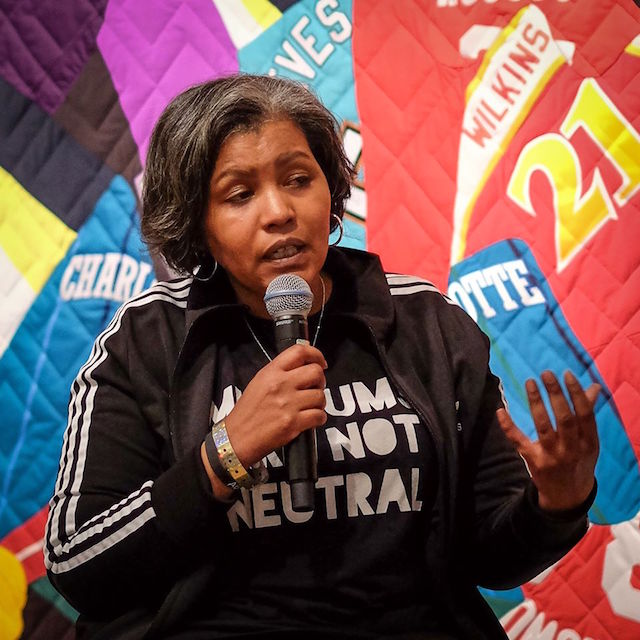
As much as I think we blew an opportunity to make our activism lives a little easier by having three reliable votes on the City Council that seemingly would support moving money from the Portland police to the communities that suffer from the Portland police, there are at least two ugly realities that cannot be avoided. First, Ted Wheeler still got 46% of the ballots cast. Wheeler has spent a good deal of his first term siccing the police force he oversees on people rising up against fascism and white supremacy. He has welcomed fascists and white supremacists into the city, including when they marched through the Montavilla neighborhood in April 2017. Not long after, Jeremy Christian, who attended that march, murdered two people and nearly killed a third after they confronted Christian for accosting two Black women on a Max Train.
When white supremacists gathered in Portland in August 2018, police apprehended a couple of them on the roof of a parking garage with guns, apparently readying to pick off anti-fascist protesters. Wheeler kept this quiet. Furthermore, after the rally at which police attacked the anti-fascists, including nearly killing one by shooting them in the head with a concussion grenade, Wheeler had little problem with then-police chief Danielle Outlaw going on a local radio show and bragging about how the police had kicked the anti-fascists’ butts.
In February 2019, it emerged that Portland police Lt. Jeff Niiya had established a friendly relationship with Joey Gibson and his band of praying patriots, advising them on how to avoid getting in trouble, including if they had outstanding warrants for their arrests. Wheeler responded by hastily cobbling together a listening session at Maranatha Church that soon descended into chaos when about 15 white supremacists were not only granted entry, but given room to speak. Wheeler sat in silence.
From the day he took office, Wheeler has let his police act like an invading army, and until September he had little to say about their use of tear gas, which they have used judiciously on protesters insisting, among other things, that Black lives matter. It took a federal judge’s order in June to theoretically reel in the police, allowing them only to use tear gas if they felt lives were in danger. They often felt imperiled, it seems, for they continued using tear gas on protesters, and in general, their violence has proceeded unabated. As the Portland Mercury’s Alex Zielinski reported on November 16, the Portland police have used force, including firing rubber bullets, beating people with batons, and shooting tear gas, against Portlanders protesting police violence and racism over 6,000 times this year.
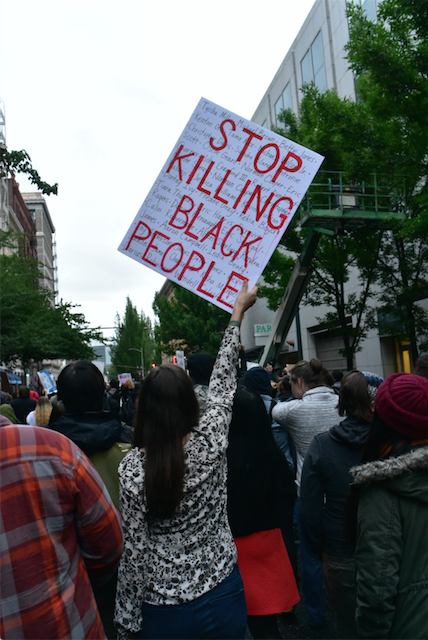
While it has long been clear that Wheeler does not oppose fascism–just for good measure his campaign ads took Iannarone to task for being anti-fascist–46% of the electorate still voted to return him to power. In retrospect it will be valuable to consider why that 46% voted as it did, instead of focusing angst on the 13% of the electorate that likely voted for Teressa Raiford. If anything, it makes good sense to listen to why they voted for Raiford, and to learn from them, particularly the good work many of them are doing in our communities.
Which dovetails with the second reality. As my Friend Nick said the other day, echoing many other folks with whom I have talked, we do not have an organized Left in Portland. Or at least not organized enough to bring forth a candidate who would have offered a much clearer alternative to Wheeler. In the end, Iannarone was about as mediocre a candidate as Wheeler.
When Wheeler won the election, he was sent a message: all he had done was good enough. He is not the only politician who got that message. Dan Ryan, who took over Nick Fish’s seat on the City Council, changed course from being all-in on reforming police and shifting money from the police to the communities they so often terrorize, to voting against it.
Ryan had a clutch of people show up at his house and break some windows after that vote, and social media was aflutter with people who felt betrayed by the 180 degree pivot from Ryan’s campaign promises. But it was entirely predictable that he would vote this way after the election. Entirely predictable.
Why would he not? As a politician, Ryan has one overarching goal: get re-elected. Any rational politician would look at the election and take from it that defunding, reforming–not to mention abolishing–the Portland police and policing as we know it in Portland has not carried the day among voters.
Four years later and a bit south of Portland, Friend Ahjamu is still organizing. So many good and great people are doing the hard and largely unseen but absolutely vital work necessary for creating a more just world, one where, for example, people won’t cast votes for candidates or initiatives that effectively ask them to decide if non-white lives are worth a damn beyond the wealth they produce for others.
This is the work that needs to be done. The soft-pedal capitalism that Joe Biden and the Democratic Party represent resembles what Arthur Schlesinger of the Kennedy Administration described as the silk glove over the iron fist that the Republicans tended to wield. The end results–colonialism, imperialism, racism, sexism, ableism, ageism, and a host of other attendant bigotries–just take a little longer for the Democrats to get to than the Republicans, but they do get there. It reminds me of what I once heard Ahjamu say: The question is whether you die by quick decapitation or slow moving cancer.
It is us–not Joe Biden, not Barack Obama, not the Supreme Court, and not any institution of this country built upon stolen land and the backs of enslaved Africans–and only us who can save ourselves.
As I have written many times, when you join an organization fighting for greater justice, you are not going to win many battles. After all, you are fighting the power of an entrenched system that a seemingly overwhelming number of people think only needs to be reformed, not to mention a hardcore bipartisan group who will gladly call upon the power of the state to bring down violence upon those who dare reach for alternatives. After all, J. Edgar Hoover once said the Black Panther Party was the most dangerous organization in the United States, and he conspired to have many of its leaders murdered or jailed. Some of them are still in prison. All, as my good and great Friend Walidah Imarisha often says, for feeding children.
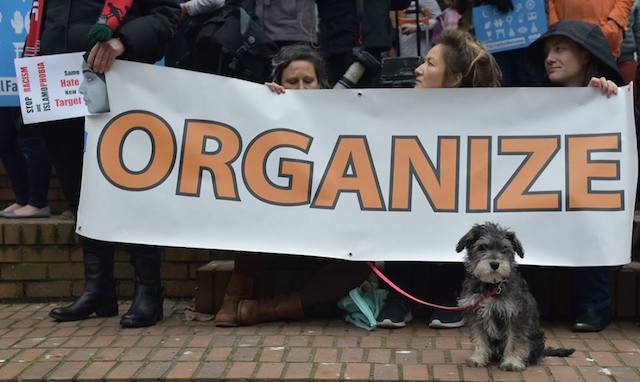
For those looking for change, real substantive change, you do not need to reinvent the wheel. I learned long ago that not only do the folks who historically have borne the brunt of the violence of capitalism have a far better understanding than I do about how to rise up and create those alternatives, they have created successful templates based on the hard work of organizing. The reason children can still (sometimes) receive lunch at school is not because Richard Nixon signed a law mandating it, but because the Black Panther Party created a successful program that showed that communities can work together and provide for the needy, not only including free meal programs, but also other essential services such as medical clinics. For those in power, that was the true crime of the Black Panther Party: It offered vibrant and successful alternatives to capitalism.
There are numerous groups doing similar work at different levels in different venues. Your problem, as I often tell folks, will not be finding one, but rather, deciding which one (or perhaps which ones) you have enough hours in your day to take part in. While the work is difficult, I wager you will never regret getting involved with others to create a more just world. You will meet people good and great, and you will likely find your own hidden talents, or ones that you previously did not find time or use for.
As I wrote four years ago, “Every once in a decent while you will win. Not very often, but if your goal really is a more just world as compared with a personal victory, often enough. And intermittently, you will win big. In a former life I was a history teacher. Every so often a student would ask me how I could remain positive in the face of some truly horrible stuff. Easy, I would say. We don’t have kings. We don’t have chattel slavery. While the world is replete with the awful, it seems to me there is less of it. That was not achieved simply by voting. Often, years and years of the hard work of organizing–including numerous losses that left little hope–doubtlessly seemed useless. And then, seemingly out of nowhere, WHAM!, a huge leap forward, but in fact a step just a bit noticeably larger than the many steps that led up to it.”
Let’s get to it.






